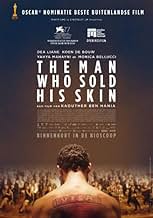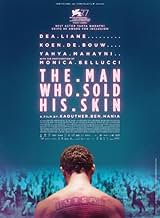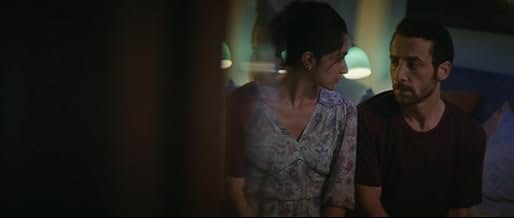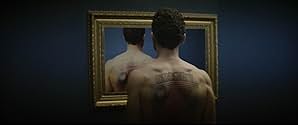NOTE IMDb
6,9/10
7,5 k
MA NOTE
Le voyage de Sam Ali, un Syrien qui a fui au Liban pour échapper à la guerre, dans l'espoir de rejoindre l'amour de sa vie à Paris.Le voyage de Sam Ali, un Syrien qui a fui au Liban pour échapper à la guerre, dans l'espoir de rejoindre l'amour de sa vie à Paris.Le voyage de Sam Ali, un Syrien qui a fui au Liban pour échapper à la guerre, dans l'espoir de rejoindre l'amour de sa vie à Paris.
- Réalisation
- Scénario
- Casting principal
- Nommé pour 1 Oscar
- 9 victoires et 12 nominations au total
Koen De Bouw
- Jeffrey Godefroi
- (as Koen de Bouw)
Avis à la une
YES! "The Man Who Sold His Skin" left me with so many answers to gut hunches I had about the businness of art and how it steals peoples souls. This is a story driven movie, simple filming some amazing shots and locations, economic dialogue that required some of the most intense acting from Yahya Mahani. This brothers abilty to show emotion was so thorough that I actually felt what he was going through. Such a powerful perfomance that I had to come on here and tell people of this movie. I have never seen or heard a story like this. A must see for REAL movie fans who need more then watching blind entertainment. I found this while searching tattoos.
"The Man Who Sold His Skin" depicts a refugee forced into an unpleasant predicament. In showing the plight of refugees, Kaouther Ben Hani's Academy Award-nominated movie also looks at the cold attitudes of supposedly highbrow individuals. The sad thing is that there are probably people in real life who have gotten subjected to this sort of thing. I recommend it.
Let's just keep in mind that this movie isn't the type of a satirical work that is meant to tackle its subject matter by probing it or offering a deeper understanding of the whole situation and, definitely, not to reach a resolution. It's rather more akin to a cautionary tale, or one that shines a spotlight on the social and political situations and what they entail, exposing the superficiality of them all by explicitly reflecting it on a seemingly unrelated surface, which is here art. Excuse my ignorance of the term that would spare me all that rambling. I just wanted to remind some people (myself included) who can easily mistake this for being too on-the-nose that it's actually intentionally so, the thing that could be clearly noticed through its self-awareness of its pretentiousness, and I couldn't imagine a more competent way to mirror that than espousing art.
The Man Who Sold His Skin revolves around a highly provocative subject of a Syrian refugee, Sam Ali, in Beirut who accepts a deal offered to him by a contemporary artist, Jeffrey Godefroi, to have his back turned into a living work of art in order to travel to Belgium. As a contemporary take on a Faustian deal, the movie truly shines. It's true this story is about a man who sells his skin (hence his identity) to the artist, Jeffrey, (he even mentioned that he sees himself as Mephistopheles) in return for "freedom," but here the protagonist is marked by a pronounced stigma, namely the Visa tattooed on his back, "this work of art bears the signature of the devil," said Mr. Waltz and his wife justifying the reason why they bought Sam. He became a flesh-and-blood example of the exploitation Syrian refugees, although he willingly became one, mainly to live with the love of his life, Abeer. That leads us to the main complaint I have with this movie: the love story, or rather the drama surrounds it.
The movie quickly makes us abandon any thought the story would be heavy on its prickly themes of human trafficking, exploitation and the commodification of people, declaring out loud it's a love story through and through. But here is the thing, the romantic dramedy elements here are too pedestrian and the characterizations severely lacking in nuance to keep me invested. Consequently, the movie drags quite often. The story also tries to stir a few emotional chords by the end, trying as hard as it can to bring out more of its potential to be a reflective drama. Suffice it to say, it falls flat on the emotional punch. What really bogged this movie down is its dense caustic encapsulation, which although it lends the social commentary the edge it needed, it definitely does seem completely discordant with both the dramatic and the romantic aspects, hindering the heart and levity from seeping out of the surface.
As art takes the centre stage, the cinematography doesn't skimp on its artistic ambitions. First movie that popped into my head watching the stunning, garish visuals in the scenes set in the gallery is Velvet Buzzsaw (Dan Gilroy's latest effort, also centred around art,) but instead of only serving its sole purpose of giving a hazardous sense, here it surpasses that by expressing the inner feelings of the characters. The compositions, in particular, that involved two or more characters resulted in some of the best shots I've seen in any movie from last year; they are truly eloquent when it comes to juxtaposing the characters' emotions and thoughts.
(6/10)
The Man Who Sold His Skin revolves around a highly provocative subject of a Syrian refugee, Sam Ali, in Beirut who accepts a deal offered to him by a contemporary artist, Jeffrey Godefroi, to have his back turned into a living work of art in order to travel to Belgium. As a contemporary take on a Faustian deal, the movie truly shines. It's true this story is about a man who sells his skin (hence his identity) to the artist, Jeffrey, (he even mentioned that he sees himself as Mephistopheles) in return for "freedom," but here the protagonist is marked by a pronounced stigma, namely the Visa tattooed on his back, "this work of art bears the signature of the devil," said Mr. Waltz and his wife justifying the reason why they bought Sam. He became a flesh-and-blood example of the exploitation Syrian refugees, although he willingly became one, mainly to live with the love of his life, Abeer. That leads us to the main complaint I have with this movie: the love story, or rather the drama surrounds it.
The movie quickly makes us abandon any thought the story would be heavy on its prickly themes of human trafficking, exploitation and the commodification of people, declaring out loud it's a love story through and through. But here is the thing, the romantic dramedy elements here are too pedestrian and the characterizations severely lacking in nuance to keep me invested. Consequently, the movie drags quite often. The story also tries to stir a few emotional chords by the end, trying as hard as it can to bring out more of its potential to be a reflective drama. Suffice it to say, it falls flat on the emotional punch. What really bogged this movie down is its dense caustic encapsulation, which although it lends the social commentary the edge it needed, it definitely does seem completely discordant with both the dramatic and the romantic aspects, hindering the heart and levity from seeping out of the surface.
As art takes the centre stage, the cinematography doesn't skimp on its artistic ambitions. First movie that popped into my head watching the stunning, garish visuals in the scenes set in the gallery is Velvet Buzzsaw (Dan Gilroy's latest effort, also centred around art,) but instead of only serving its sole purpose of giving a hazardous sense, here it surpasses that by expressing the inner feelings of the characters. The compositions, in particular, that involved two or more characters resulted in some of the best shots I've seen in any movie from last year; they are truly eloquent when it comes to juxtaposing the characters' emotions and thoughts.
(6/10)
The opening scene shows a framed item being hung in a stark white exhibition space. We're then greeted to the sound of purring cat as a man stirs awake. This is, for the most part, the nearest we get to a happy scene: 'The man who sold his skin' is an excellent film, but it's not a particularly pleasant story being told.
There is an unyielding tension pervading the feature that comes from the mere knowledge of the premise, let alone seeing the narrative play out. Passing moments of levity, and the quality of the film-making craft on display, help to offset that feeling, and an accompanying melancholy, but don't truly make this easier to watch.
Yet make no mistake, 'The man who sold his skin' is a fine film, very well made. Writer-director Kaouther Ben Hania's camerawork is exquisite, with many eye-catching shots as worthy of appreciation as any piece of art in a museum. There are several instances where lens flare, or the refraction of light through glass, is used to partly obscure a shot with an artistic touch that I think often gets lost in many pictures employing the same tricks. Then, too, the music of composer Amine Bouhafa catches our attention to, perfectly complementing the scenes we see.
And the cast is outstanding. The only actor here I distinctly recognize is Monica Bellucci, whose presence is surprising but welcome, as she brings an entrancing, understated intensity to her role. I could swear I've seen Koen De Bouw in other features, though a glance at his credits suggests otherwise. Still, there's a purposefulness, and cunning, in his countenance that we can't tear our eyes away from. Above all, though, I would love to learn more about Dea Liane, and star Yahya Mahayni, whose lack of renown belies great skill. It's a joy to see them at play, and I'd love to watch more of their features.
Engrossing as Ben Hania's screenplay is, the narrative is a thinly veiled vehicle for stark themes of human rights, racism, exploitation, dehumanization, and the tricks we fool ourselves into believing in pursuit of a better life. There are some especially ugly and cringe-worthy moments on display as these notions are laid as bare as the skin on protagonist Sam Ali's back. Once more - it's undeniably captivating, but viewers looking for an uplifting flick may wish to look elsewhere.
Still, when all is said and done, the ending is a little bit shocking, yet also deeply rewarding. It's a fine capstone to a film that has explored some very murky territory, and further credit to the writing.
There's no question in my mind that 'The man who sold his skin' is well deserving of every accolade to come its way. It can be a difficult movie to watch at times, but it's so well made that it's a journey very much worth taking, and finding to watch wherever you can.
There is an unyielding tension pervading the feature that comes from the mere knowledge of the premise, let alone seeing the narrative play out. Passing moments of levity, and the quality of the film-making craft on display, help to offset that feeling, and an accompanying melancholy, but don't truly make this easier to watch.
Yet make no mistake, 'The man who sold his skin' is a fine film, very well made. Writer-director Kaouther Ben Hania's camerawork is exquisite, with many eye-catching shots as worthy of appreciation as any piece of art in a museum. There are several instances where lens flare, or the refraction of light through glass, is used to partly obscure a shot with an artistic touch that I think often gets lost in many pictures employing the same tricks. Then, too, the music of composer Amine Bouhafa catches our attention to, perfectly complementing the scenes we see.
And the cast is outstanding. The only actor here I distinctly recognize is Monica Bellucci, whose presence is surprising but welcome, as she brings an entrancing, understated intensity to her role. I could swear I've seen Koen De Bouw in other features, though a glance at his credits suggests otherwise. Still, there's a purposefulness, and cunning, in his countenance that we can't tear our eyes away from. Above all, though, I would love to learn more about Dea Liane, and star Yahya Mahayni, whose lack of renown belies great skill. It's a joy to see them at play, and I'd love to watch more of their features.
Engrossing as Ben Hania's screenplay is, the narrative is a thinly veiled vehicle for stark themes of human rights, racism, exploitation, dehumanization, and the tricks we fool ourselves into believing in pursuit of a better life. There are some especially ugly and cringe-worthy moments on display as these notions are laid as bare as the skin on protagonist Sam Ali's back. Once more - it's undeniably captivating, but viewers looking for an uplifting flick may wish to look elsewhere.
Still, when all is said and done, the ending is a little bit shocking, yet also deeply rewarding. It's a fine capstone to a film that has explored some very murky territory, and further credit to the writing.
There's no question in my mind that 'The man who sold his skin' is well deserving of every accolade to come its way. It can be a difficult movie to watch at times, but it's so well made that it's a journey very much worth taking, and finding to watch wherever you can.
The Man Who Sold His Skin is a pretty good movie. And it's one about art that to an extent shares my feelings and opinions of it. Meaning, that I was naturally inclined to like it as soon as I understood what was going on... And I did.
But the movie comes with its own collection of flaws that are a little too big to miss. The greatest complaint I have is that the movie overall seemed aimless. Aimless in that there was no one destination the writers felt comfortable diving deep into. Rather, the movie keeps itself safe on the surface; often finding itself at the door of a sophisticated and thought provoking conflict, but hesitates entering or engaging with those questions. Another minor complaint is the ending; which after all what the movie has been about, felt a little too cheesy.
Overall, I like what the movie is about, and I'm glad I watched it. The complaints I have are not too great to prevent one from enjoying the movie.
But the movie comes with its own collection of flaws that are a little too big to miss. The greatest complaint I have is that the movie overall seemed aimless. Aimless in that there was no one destination the writers felt comfortable diving deep into. Rather, the movie keeps itself safe on the surface; often finding itself at the door of a sophisticated and thought provoking conflict, but hesitates entering or engaging with those questions. Another minor complaint is the ending; which after all what the movie has been about, felt a little too cheesy.
Overall, I like what the movie is about, and I'm glad I watched it. The complaints I have are not too great to prevent one from enjoying the movie.
Le saviez-vous
- AnecdotesWhile director Kaouther Ben Hania was visiting the Louvre Museum in Paris in 2012, there was a retrospective of Belgian artist Wim Delvoye. There she saw, in Napoleon III's apartments, Delvoye's Tim (2006 - 08), in which the artist had tattooed the back of Tim Steiner, who was sitting on an armchair with his shirt off displaying Delvoye's design. The piece was sold to a German art collector and Tim is contractually obliged to spend a certain amount of time, topless and sitting still, in a gallery every year. Wim Delvoye appears in the movie as the insurance guy.
- GaffesWhen Sam Ali changes his seat at the train at 05:55, the place of the man in the back seat changes each time the camera switches between Sam and Abeer.
- ConnexionsFeatured in La 93e cérémonie des Oscars (2021)
- Bandes originalesFiliae maestae Jerusalem, RV 638: I, 'Filiae maestae Jerusalem'
Music by Antonio Vivaldi (uncredited)
Conducted and Performed by Philippe Jaroussky (Audio) (p)
Performed by Ensemble Artaserse (uncredited)
2014 Erato/Warner Classics, Warner Music UK Ltd.
Meilleurs choix
Connectez-vous pour évaluer et suivre la liste de favoris afin de recevoir des recommandations personnalisées
- How long is The Man Who Sold His Skin?Alimenté par Alexa
Détails
- Date de sortie
- Pays d’origine
- Sites officiels
- Langues
- Aussi connu sous le nom de
- The Man Who Sold His Skin
- Lieux de tournage
- Sociétés de production
- Voir plus de crédits d'entreprise sur IMDbPro
Box-office
- Budget
- 2 230 000 € (estimé)
- Montant brut mondial
- 227 290 $US
- Durée
- 1h 44min(104 min)
- Couleur
- Mixage
- Rapport de forme
- 2.39 : 1
Contribuer à cette page
Suggérer une modification ou ajouter du contenu manquant





























